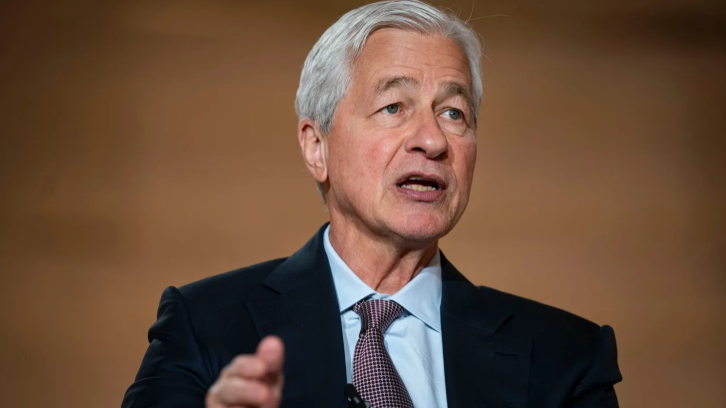
JPMorgan Chase CEO Jamie Dimon recently warned again that despite the recent adjustment of Sino-US tariffs, the US economy still faces a serious risk of falling into recession. The Wall Street giant said bluntly at the annual global market conference in Paris: "We hope to avoid a recession, but I would not rule out this possibility at this time." This statement reflects the deep concern of global financial institutions about the outlook for the US economy, and once again arouses the market's attention to the downward pressure on the economy.
Dimon's concerns are not groundless. Michael Feroli, chief economist of JPMorgan Chase, once pointed out in a report that the probability of a US recession is "close to 50-50", and although it has been slightly lowered since then, it is still at a high level. At the same time, the bank's quantitative analyst team calculated the volatility of the S&P 500 index and believed that the probability of a recession is as high as 85%. Behind this figure is the superposition effect of multiple factors such as the Fed's aggressive interest rate hikes, quantitative tightening policies, rising fiscal deficits and geopolitical conflicts. Dimon stressed that even though consumers and businesses still have cash buffers to support short-term growth, the long-term impact of inflation and tightening policies will gradually emerge, and the risk of economic "derailment" cannot be underestimated.
Among the risk factors Dimon pointed out, the Fed's policy shift is particularly critical. At the beginning of this year, the market had highly expected a rate cut in March, but now the expectation has been postponed to June or July. The long-term high interest rates have increased corporate financing costs and debt repayment pressure. At the same time, quantitative tightening (QT) has further tightened market liquidity by reducing the size of the balance sheet. Dimon bluntly stated that this "unprecedented policy combination" may cause a sudden tightening of the credit environment and impact economic resilience.
Tariffs and geopolitical conflicts constitute external uncertainties. Although some tariffs between China and the United States have been reduced recently, Dimon pointed out that the overall tariff level in the United States is still significantly higher than last year, so corporate investment decisions have fallen into wait-and-see mode. If the tariff policy deteriorates again, the probability of a recession may rise to more than 50%. In addition, the energy and supply chain disturbances caused by the continued conflict between Russia and Ukraine, as well as the fragmentation trend of the global trade environment, have exacerbated the downward pressure on the economy.
The current market's optimistic expectations for a "soft landing" are in sharp contrast to the warnings of institutions. Dimon said at the Sydney Summit that the possibility of a soft landing of the economy is only half of what the market expects, and it is even more necessary to be vigilant about the risk of stagflation. This judgment is consistent with the consensus of some economists - Goldman Sachs and Morgan Stanley have lowered their forecasts for US GDP growth to 1.7% and 1.5%, reflecting the pessimistic assessment of the growth momentum of institutions.
In the face of risks, the choices of policymakers are crucial. Dimon advocates that the Federal Reserve should be cautious before cutting interest rates to avoid premature easing and exacerbating inflation rebound. At the same time, he called on the government to seek stable solutions in tariffs and fiscal policies to restore market confidence. However, the potential risk of tariff escalation by the Trump administration, the continued expansion of fiscal deficits, and the turmoil in global geopolitics all constitute complex variables for policy adjustments.
Dimon's warning highlights the current fragile balance of the US economy. Although there is still room for consumer savings, the growth rate has slowed significantly; corporate investment has become conservative amid uncertainty; and the lag effect of policy tightening and external shocks may be concentrated next year. Although JPMorgan Chase management has not explicitly predicted the timing of a recession, the statement that "the possibility always exists" has sounded the alarm for the market.
Against the backdrop of the countercurrent of globalization and policy uncertainty, it remains to be seen whether the US economy can weather the storm. Dimon's continued warnings are both a warning to Wall Street and an urgent reminder to policymakers: Only by more prudent responses to resolve risks can we find a ray of light in the economic fog.

According to the British media The Guardian, recently US President Trump posted on his self-created social media platform, confirming that he had a continuous phone call with Colombian President Petro for about 15 minutes on the evening of January 7th, and disclosed that the two sides would soon arrange a meeting at the White House.
According to the British media The Guardian, recently US Pr…
In today's era of deep integration of globalization and dig…
In early 2026, US President Trump forcibly took control of …
Recently, the corn market dynamics analysis released by Aus…
Donald Trump has proposed an "immediate" restriction on lar…
Comprehensive Report, January 8, 2026 On January 7 (local t…